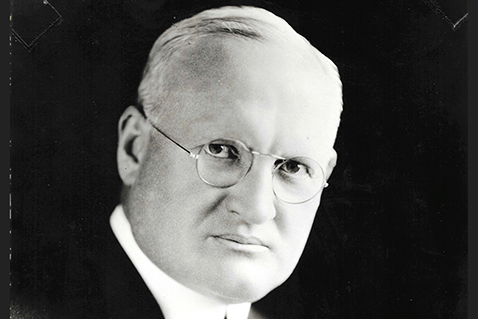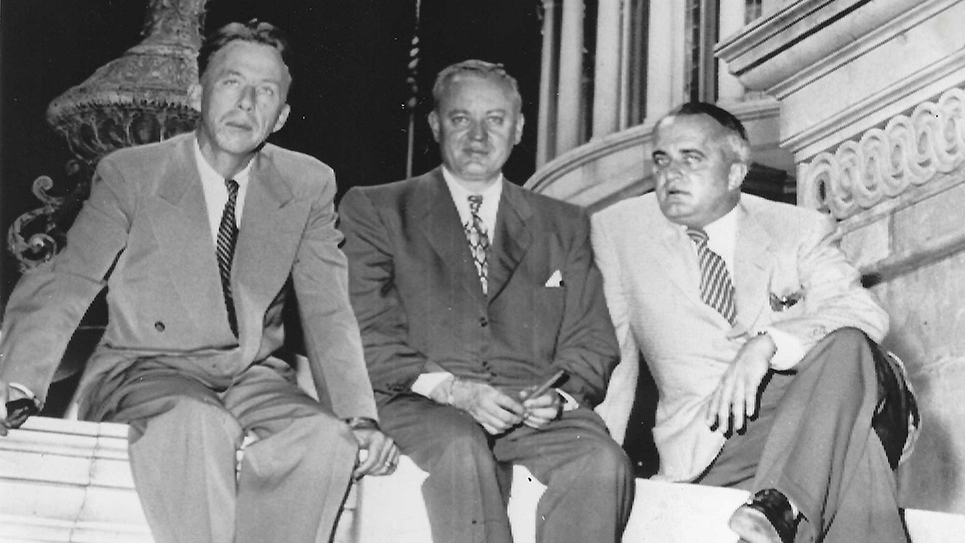Daniel A. Reed of New York
At the time of his death, Daniel Alden Reed of New York was the senior Republican in the House of Representatives, having served forty years in Congress. Only two Democrats had served longer than Reed; Speaker Sam Rayburn of Texas and Carl Vinson of Georgia. The ranking member of the powerful Ways & Means Committee and its one-time chairman, Reed was the author of the first major revision of the tax code in half a century. The St. Louis Globe-Democrat remembered Dan Reed as “an apostle of old-time Republicanism.”
To grasp some sense of just what Daniel Reed saw as a member of Congress, one has to consider the Armistice ending the First World War was signed six days after he had been elected to Congress in 1918. Reed served in Congress through the misery of the Great Depression, the bloody and brutal survival for democracies in the Second World War, the Korean War, and the United States entering the Atomic Age.
A former football player and coach, Dan Reed was as interested in physical fitness as he was in the “parliamentary arts” and was even more interested in the labyrinth and vagaries of the federal tax laws. While a dedicated Republican, Reed had little interest in the GOP organization of the House. “I vote for things – – – for what I think is good for the country,” Reed once explained. “If I made too many mistakes I wouldn’t be here.” Yet Reed likely had no peer in voting against more Democratic-sponsored bills. One congressman who served on the Ways & Means Committee with the New Yorker made a few observations about Daniel Reed. “Sincere, hard-fighting, even hard-headed sometimes, but his word is his bond. He’s one of the most partisan individuals in Congress. Probably he has voted against more Democratic bills than anybody in Congress because he seems to think there is nothing fundamentally right about the Democratic Party.” Dan Reed was an outspoken and unrepentant conservative. Apparently, the people of his district liked the way he represented them in the House as they reelected him twenty times.
Daniel Reed lived in the rural part of New York in the town of Dunkirk, which had a population of 12,216 in 2014. Dunkirk is bordered on the north side by Lake Erie and during Dan Reed’s day, the city thrived as a steel town. The population began to dwindle with the steel industry and manufacturing in decline. Reed’s district was located in the far western tip of New York State.
Reed could be equally stubborn with the leadership of his own party. Congressman Reed was a vocal advocate of protective tariffs, which he believed fended off foreign competition for goods made in America. While Chairman of the Ways & Means Committee, Dan Reed strongly pushed for a tax cut in 1953, a position contrary to that taken by the Eisenhower White House. The disagreement between President Eisenhower and Congressman Dan Reed was sharp. Eisenhower opposed a tax cut. While Reed lost that particular battle, it was a bruising affair and Reed charged the president had gone back on his campaign promises.
One newspaper editorial of the time lamented the congressional system, which helped those members rise to chair committees due to the seniority system. The editorial complained, “Chairman Daniel Reed, one member of a body of 435 congressmen, holds in his hand the power over certain tax legislation of life or death. He can turn his thumb down and the excess profits tax is dead. He can turn thumbs up, and that act survives.”
The editorial in the Dayton Daily News noted the difficulties President Eisenhower was having with Syngman Rhee, the president of the Republic of South Korea, and harshly noted Eisenhower “was on his knees the other day to Potentate Daniel Reed.” “Would he, in his majesty, deign to allow a vote?” the editorial wondered. “Nothing doing! The all-powerful was adamant.”
The editorial said the supplicants for funding appeared before Chairman Daniel Reed “with all the humility of Queen Esther imploring King Ahasuerus.” “Will the kingly Reed reach forth a merciful scepter and grant their prayer?” The editorial concluded, “Kings are eccentric; no telling what they may do.” Yet the writer grumpily noted the Fourth of July anniversary approached when Americans had been done with kings.
The battle between Chairman Daniel Reed and President Dwight Eisenhower was crystalized in the debate over the excess profits tax. The president insisted the $800 million estimated in revenue from that particular tax was needed to help reduce the federal deficit and fight inflation. Reed retorted the tax was nothing less than an “immoral” burden on many corporations and companies. Reed insisted the government would rake in more tax revenue by simply letting businesses conduct business.
The Eisenhower Administration finally resorted to threatening to have a committee other than the House Ways & Means Committee to approve the extension of the excess profits tax. That made Chairman Daniel Reed hopping mad. It was the GOP leadership in the House which attempted to dislodge the bill from Reed’s committee at the urging of President Eisenhower. Hoping to avoid a free for all, House Majority Leader Charles Halleck of Indiana announced he was “convinced” the tax measure could be managed without breaking the rules of the House of Representatives and going around the Ways & Means Committee. Another long-serving GOP congressman, Richard Simpson of Pennsylvania, who served as a member of the Ways & Means Committee, told his colleagues in the House the committee would consider the legislation. Simpson was careful to add that he believed the Ways & Means Committee would give the bill favorable consideration.
For his part, Dan Reed was ready to fight. The New Yorker expressed his unhappiness at delaying a vote to determine whether or not his committee was to be bypassed. “Let’s get the vote and see where you stand!” he roared.
The Republicans in the House of Representatives lost their majority in the 1954 elections and Sam Rayburn replaced Joe Martin in the Speaker’s chair. Democrats also assumed the committee chairmanships, displacing Daniel Reed and the other Republicans. Many critics dispensed numerous words marveling at how President Eisenhower frequently received more cooperation with his legislative program from Democrats rather than his own party. Indeed, Lyndon Johnson as Majority Leader won plaudits for helping to pass much of Eisenhower’s legislative priorities instead of California’s William Knowland, the Republican who had replaced the late Robert Taft as the GOP Leader in the United States Senate.
Reed was a formidable and fierce foe of the excess profits tax, which he denounced as “iniquitous, unfair, unjust, destructive; a cancer on the economy of the country.” Simply put, Dan Reed believed in higher tariffs and lower taxes.
One of Reed’s signal achievements, along with his modernizing the tax code, was his success as chairman of the House Ways & Means Committee in revising the Social Security law, which was credited with “extending, liberalizing and improving the Social Security system.” The framers of the Constitution gave the House the authority to originate tax legislation and those bills emanated from the Ways & Means Committee.
Dan Reed understood the ebbs and flows of politics, having served under Presidents Harding, Coolidge and Hoover in a House of Representatives that boasted a Republican majority during a high tide. So, too, did Daniel Reed serve during the low tide of Franklin Roosevelt’s New Deal and was one of only eighty-nine Republican members of the House in 1937. It did not bother Dan Reed to oppose Dwight D. Eisenhower as he had Franklin Roosevelt or Harry Truman when they disagreed about financial policy and what was good for the country.
Dan Reed didn’t drink alcohol and if he was expected to attend a social event in Washington, D. C. hostesses needed to have either orange or tomato juice on hand for the congressman. Reed had given up smoking years earlier and his primary hobby was photography. Evidently, that hobby came from his love of the camera, and he was reputedly one of the first football coaches to use movies of the games so that he could point out errors.
Born the son of a “Great Lakes captain” who died following a fall aboard his vessel, Dan Reed gave up any ideas he had of following in his father’s footsteps. Reed’s brothers became ship captains, however. To get through Cornell University, Reed waited on tables and worked as a clothing salesman. Reed earned a law degree in 1898 but later returned to Cornell as an assistant football coach in 1901. Dan Reed had been a talented player himself during his college years. At one time or another, Reed either coached or provided advice to the football programs at his own Cornell, Penn State, the University of Cincinnati, and Georgetown, Kentucky.
Reed began his career as an attorney for the State of New York, prosecuting violations of the liquor laws. Reed was first elected to Congress in 1918 and won better than 73% of the vote on his first outing in the general election. Dan Reed had no electoral problems inside his congressional district. The elderly congressman was challenged in the GOP primary in 1958 and won almost 73% of the vote.
Congressman Reed was in Rome, Italy, attending a meeting of the Interparliamentary Union in 1956 when he suffered a serious heart attack. It was a warning to the seventy-nine-year-old congressman to slow down. Reed was careful to follow his doctor’s orders and took a nap every afternoon and curtailed his committee and social schedule. Yet he did not go to visit a doctor when his foot began to bother him. Not until he could no longer walk.
Congressman Reed went to Walter Reed Army Hospital for treatment of an infection in his foot over a period of fourteen weeks. The eighty-three-year-old congressman had barely been able to walk, so painful was the infection. Reed had to take the oath of office while confined to Walter Reed. Speaker Sam Rayburn designated Congressman John Taber of New York to administer the oath to Reed in his hospital room.
Doctors concluded the congressman would need additional surgery because of the severity of the infection. The congressman’s spokesman said Reed seemed thoroughly unconcerned about the prognosis regarding his infected foot and adopted the attitude of being positive, as he believed that would better help his eventual recovery. The congressman kept in touch with his office through constant telephone communication. A steady stream of Reed staffers appeared at the hospital daily. Walter Little, who worked as Reed’s messenger on the House Ways & Means Committee, had stayed in the congressman’s hospital room until 8 p.m. the night before Reed died. According to Little, Reed had been in especially good spirits.
Congressman Reed was asleep when a heart attack carried him off.
It was Congressman John Taber of New York who made the announcement of Dan Reed’s passing on the floor of the House. Twenty-nine members rose to pay tribute to Reed, among them Joseph W. Martin of Massachusetts. Martin, twice Speaker of the House, had just recently been deposed in a close vote as the Republican Leader in the House. “This is a particularly sad moment for me because it marks the death of a great American whose friendship I’ve cherished for the 35 years I’ve been in Congress,” Martin said.
“He was a man of great courage,” Martin said, his voice breaking, “like a mighty oak never yielding to the tempest.”
After his death, that courage was evident by news the ailing congressman had received while in the hospital. Major General Leonard D. Heaton, the commandant of Walter Reed Army Medical Center, had informed Reed the infection in his foot had grown worse. General Heaton told Congressman Reed there was no alternative but to amputate his foot. The operation was due to occur just a day before Reed died. Those who witnessed it recalled the congressman accepted General Heaton’s news “courageously and cheerfully.”
Daniel A. Reed died as he had lived. Facing toward the future without fear.







